Does A Composting Toilet Smell? What You Need To Know!
-
Pete Ortiz
- Last updated:

Most people today are opting for a greener, more environmentally friendly way of building toilets. With climate change and environmental degradation, it is only reasonable to think of a less wasteful form of toilet construction, which will reduce water pollution.
One of the best alternatives is the composting toilet, which converts waste into manure and does not require water to work. However, there are major concerns about the bad smell that has been associated with the toilet, discouraging a huge number of people from going for it.
So, is it true, or is it just a marketing ploy to keep flushing toilets from going out of business? Well, stick around, and let’s find out!
How Do Composting Toilets Work?
The composting toilet works through a process of decomposition and evaporation to separate the waste from the water. The water is then evaporated through a vent system while the solid waste is stored and decomposed naturally to form fertilizer.
Basically the liquid waste evaporates, composting tissue paper and waste, and ensuring the resulting product is safe for use as fertilizer.
For an effective decomposition with no smell, a proper mixture of oxygen, moisture, heat, and organic material is required. It provides optimum conditions for bacteria to transform the waste into fertilizer. If properly done, the resulting product will be odor free and ready for use in your gardening.
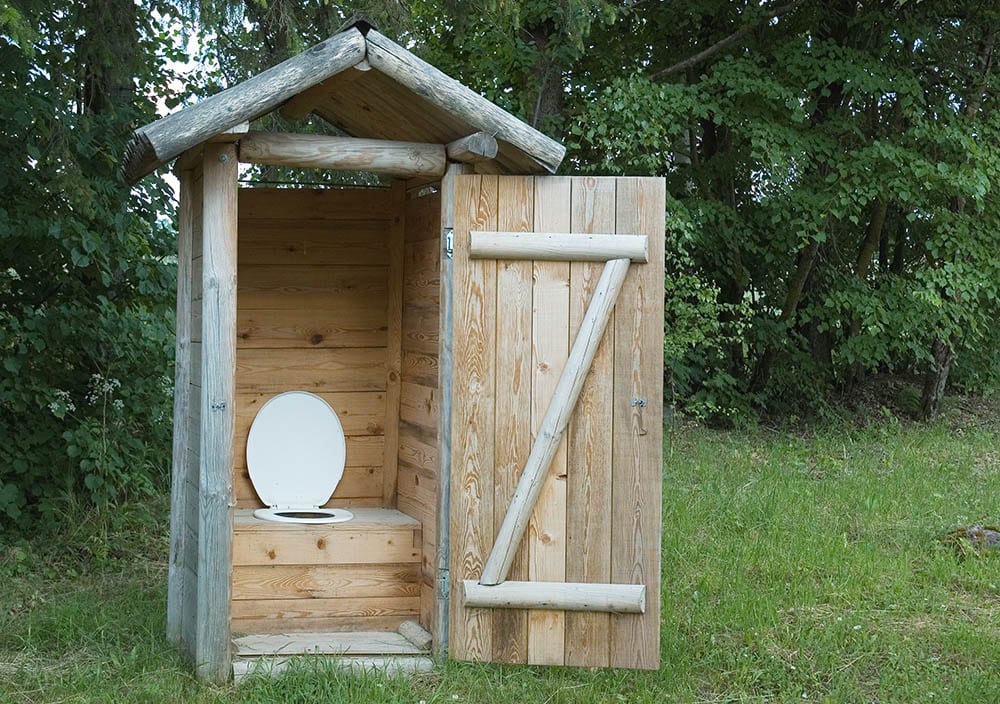
What Causes Some Composting Toilets to Smell?
The main reason your composting toilet may produce a pungent smell throughout the house is the ventilation system. Human waste is stored in a holding tank under the toilet, which means there is a need for the safe removal of the bad smell that comes with it.
Without a proper ventilation system, the bad smell will find other ways of seeping through the tank into your house.
Simple types of composting toilets have a fan connected to the tank, which sucks the gas out through a ventilation pipe. Different types of composting toilets have different types of ventilation, with more sophisticated options available. This will include a combination of fans, vents, and negative air pressure.
Can You Smell the Odor from the Composting Toilet Outside the House?
You may be safe from the smell while inside the house; however, what about the smell that comes from the vent and is expelled outside? Does it smell?
Although the vent expels the smell outside, you can rest easy knowing that as long as the decomposition is done effectively, the smell will not be felt. However, if you stand too close to the vent, the smell will be felt.
If the smell becomes too much and you feel it a distance away from the house, then the decomposition may have a problem.
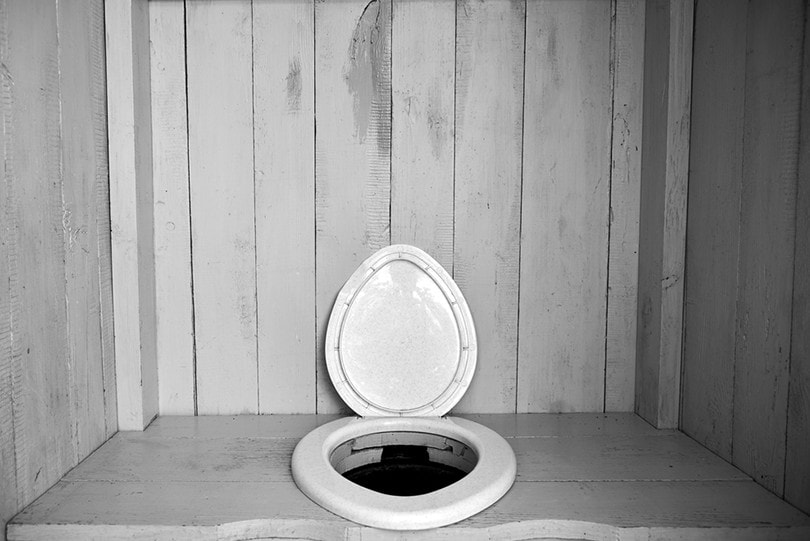
Will Composting Toilets Attract Insects?
As long as the composting toilet is working properly, then you will be safe from insects. Insects are attracted to the waste through the smell, which if kept under control will prevent them from finding your toilet.
However, this does not mean insects will not stumble onto your toilet. Ensure you check around the vents and ensure there is no way insects will get into the toilet. Also, any preventive methods will go a long way in preventing insects from finding your toilet.
What to Do If Your Toilet Smells Bad
You may end up with a smelling toilet on your hands with no experience on what to do. Here are a few techniques to help remedy the situation.
Correct Moisture Level
One of the most important facts to know about composting toilets is the moisture level inside the toilet. The waste should be moist rather than clogged with water. In case the waste comes into the decomposing chamber with too much water, there will be insufficient oxygen for composting, and odor will be emitted.
If the waste comes in with too little moisture, then the decomposition process will not get properly done, and you will still have odor problems. Therefore, it’s crucial to keep the moisture level balanced.
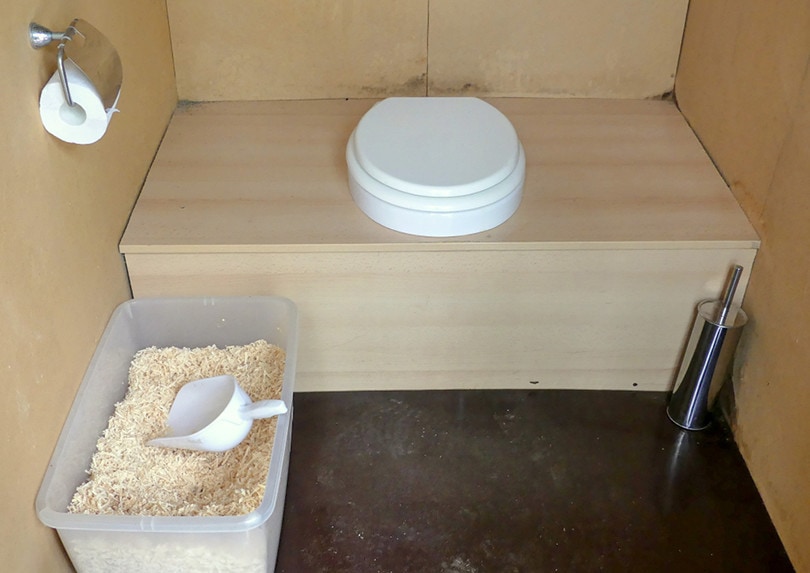
Keep Efficient Conditions for Bacteria
Composting toilets require anaerobic bacteria, which help decompose waste with the help of oxygen. An insufficient amount of bacteria means insufficient decomposition, which may end up producing bad odors. This is part of the reason chemicals are discouraged in the breakdown process as they may kill the needed bacteria.
Try to provide optimum conditions for the multiplication of bacteria to ensure effective decomposition.
Odor Control Products
Several products can help the decomposition and odor control. You can get organic products to ensure no threat is posed to the bacteria inside the toilet.
You can also add a solar panel that will heat the extra moisture inside the tank, helping in the evaporation process, ensuring proper decomposition.
Toilet paper is also an amazing moisture-absorbing tool. Apart from a smooth wipe, you are encouraged to use toilet paper if you have a composting toilet to help in the control of moisture inside the tank.
Multiple Holding Tanks
Simple types of composting toilets come with one holding tank, which increases the risk of spreading odor in case you choose to open the lid. But more sophisticated types come with separate holding tanks at a safe distance from the toilet.
The good news is that modern types of composting toilets come with sealed tanks. Thus, with sealed or multiple tank toilets, you won’t have odor problems.
How to Handle the Urine in a Composting Toilet
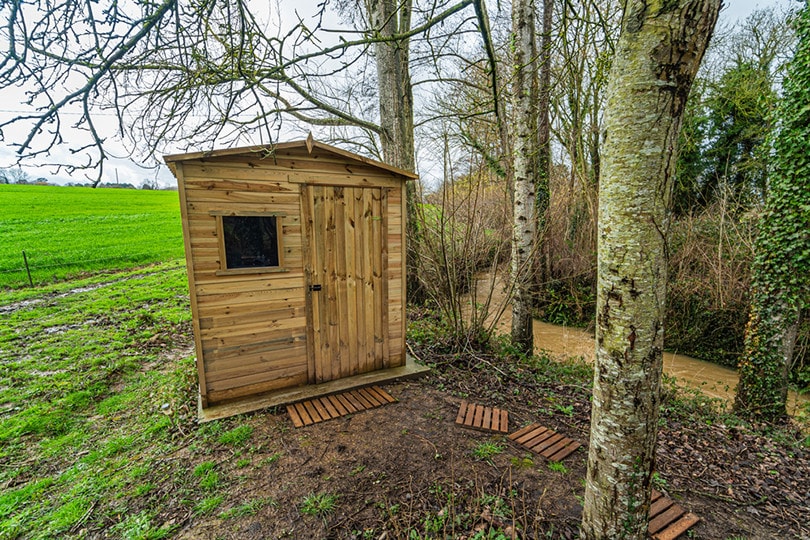
Due to the importance placed on controlled moisture levels to help with the fast and effective decomposition of waste, most people ask if pee will have a negative impact on a composting toilet.
The answer depends on the kind of toilet you buy. For toilets with separate chambers, the pee will be eliminated effectively without affecting the decomposition of solid waste.
However, for toilets with one tank, the time taken for decomposition may increase. This is due to oversaturation of the waste through urine which increases the moisture levels, increasing the time taken for proper decomposition.
Emptying a Composting Toilet
If your tank fills up, you have to empty the contents, which is a pretty straightforward process. Open the top of the toilet, remove the waste tank, and dump the decomposed waste. Clean the toilet and interchange the waste container.
The process may seem a bit yucky for most people; however, the waste is odorless by the time you dump it, and handling it will not be disgusting.
Make sure you wear protective gear such as gloves and a mask while handling the waste to protect yourself from bacteria. Use soap and water to wash up after cleaning and replacing the tank.
Best Advice on Composting Toilets
- Don’t get a small composting pit. A small composting pit may be more economical, but you may have to empty the tank frequently, compared to bigger ones which may take at least three months to get emptied. A small tank may also hinder proper decomposition due to the time it takes to get filled up.
- Use a compost starter. Most composting toilets will advise having some starter within the toilet to help kick start the process of decomposition. One of the ways you can do it is by adding some soil or using a special starter. The latter is the best choice, as soil may come with unwanted pests that may end up being a nuisance.
 Frequently Asked Questions
Frequently Asked Questions
What are the benefits of composting toilets?
Some of the advantages of having a composting toilet are:
- You will save up to 30,000 liters of water annually—this is about a swimming pool’s worth of water a year.
- You can save electricity by hooking up the fan to a solar panel, allowing it to still work efficiently.
- After the initial cost of installation, you will require a little money to keep the toilet running, which may be the occasional bottle of enzymes.
- Little to no environmental impact, rather is even great for the environment as the resulting waste is turned into fertilizer.
The pros include:
- Traditional toilets use no power while composting toilets will require power to run effectively
- Composting toilets are more expensive than traditional toilets on their initial installation
- Risk of the smell if poorly maintained
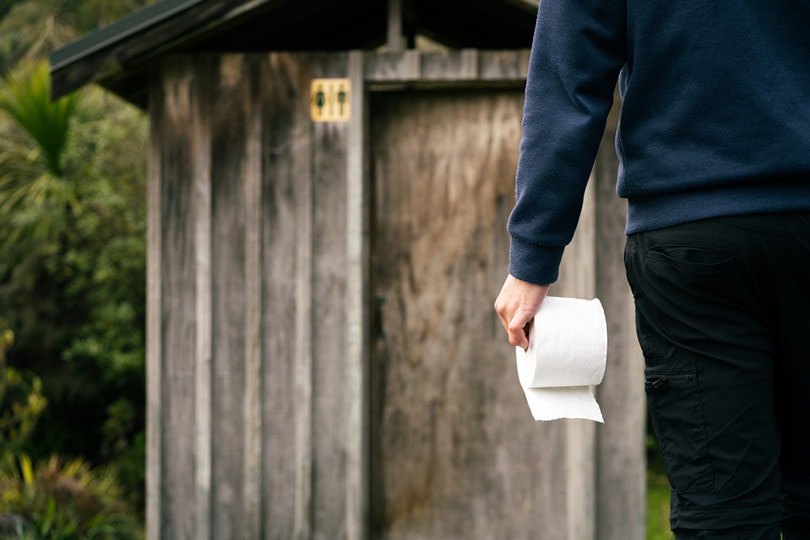
How often should you clean a composing toilet?
The number of people using the toilet affects how fast the tank fills up. As a general rule of thumb, two people regularly using the toilet will fill it up in around three weeks.
In terms of cleaning, you can do it as much as you can, keeping it fresh with fresh aromatic scents to help with the ambiance.
Are composting toilets allowed by law?
There are no laws that impact the whole country on an equal scale when it comes to composting toilets. Depending on codes set by your county, state, or municipality, you can find out whether or not composting toilets are allowed.
Can composting toilets be used for RVs or tiny homes?
Yes, there are composting toilets made for mobile homes, and will handle any violent jerks without getting damaged.
Does the fan run constantly?
It depends on how much the toilet is used. If it is in constant use, the fan should be on 24/7 to ensure no odors and effective decomposition.
Conclusion
Composting toilets are the next thing for a world relying more on environmentally friendly ways of life. Plus, you can use the toilet while on a trip as it does not need a sewer system or water to function. You will also end up changing waste to a usable product for your food.
As for the smell, that depends on the type of compost tanks and the condition set, such as moisture levels. If everything is set right, the composting will run smoothly, and you will not have to worry about odors.
Featured Image Credit: aitoff, Pixabay
Contents


 Frequently Asked Questions
Frequently Asked Questions